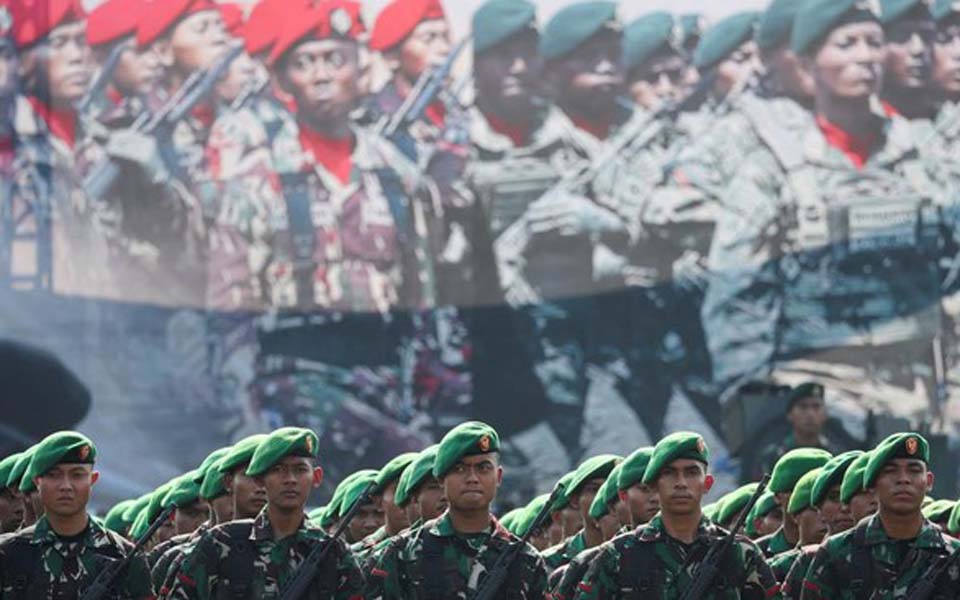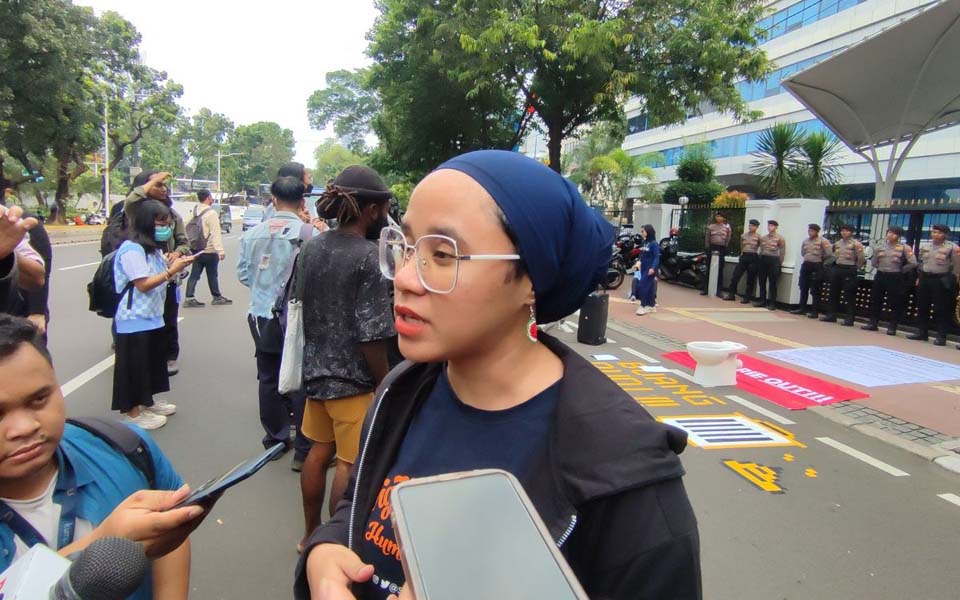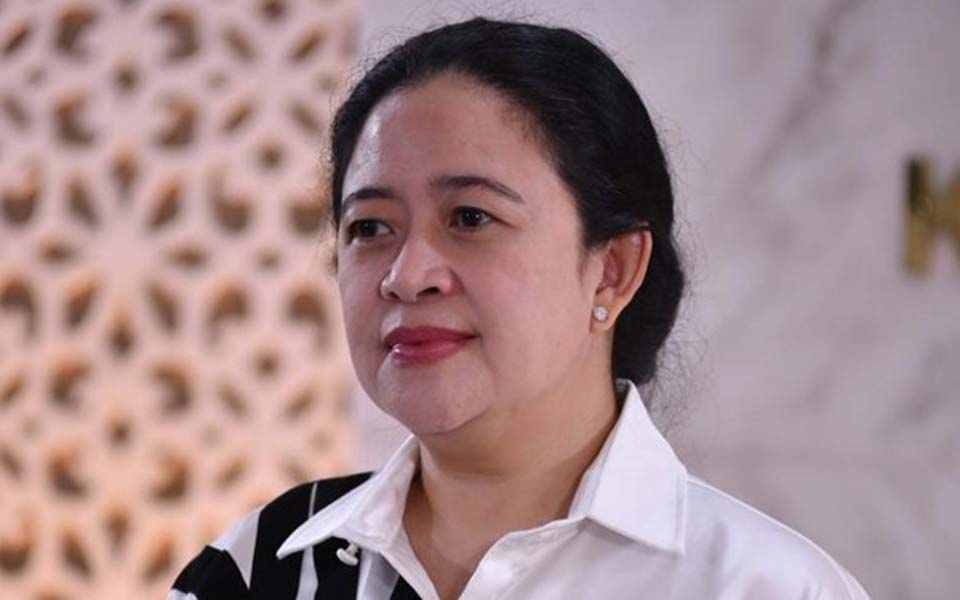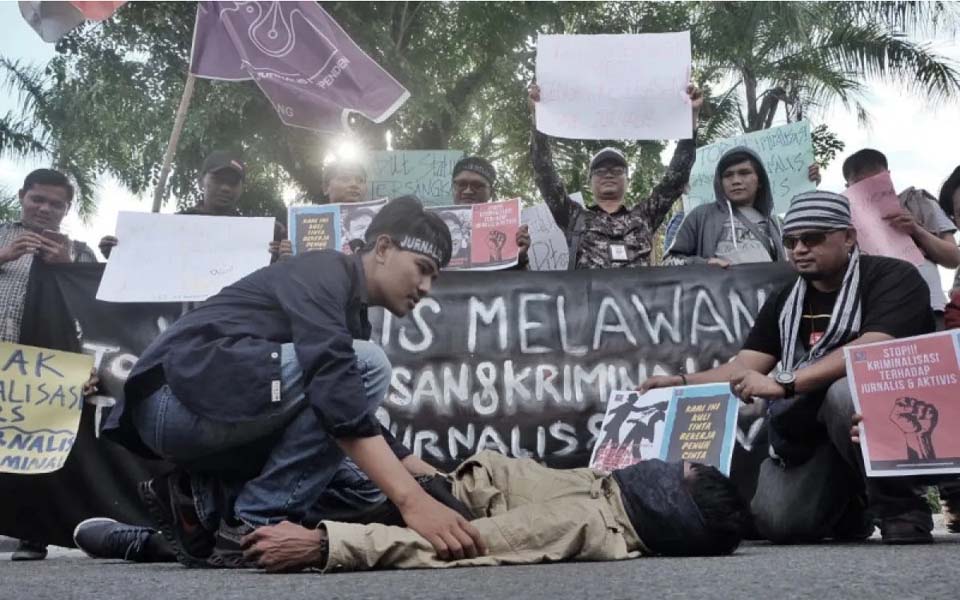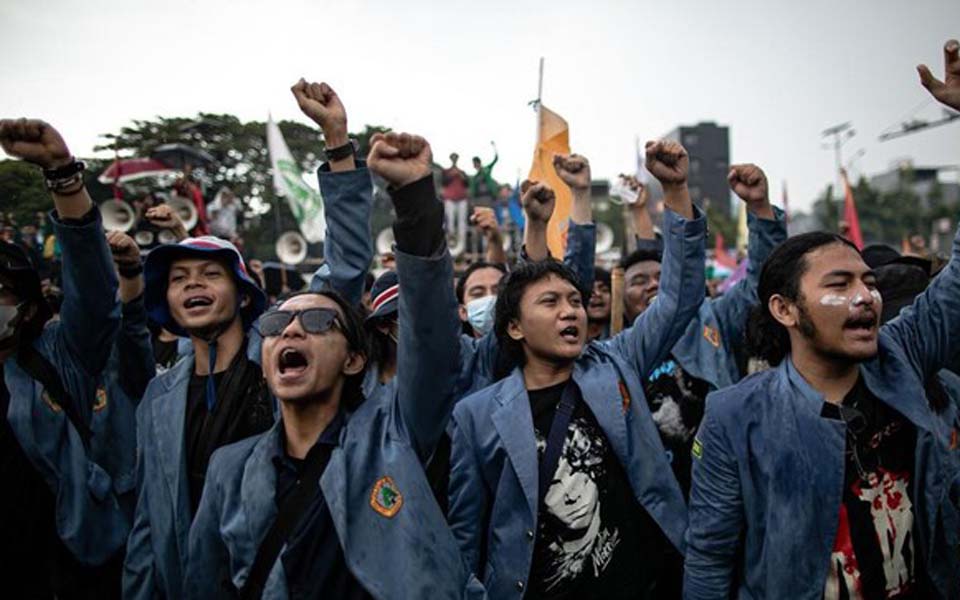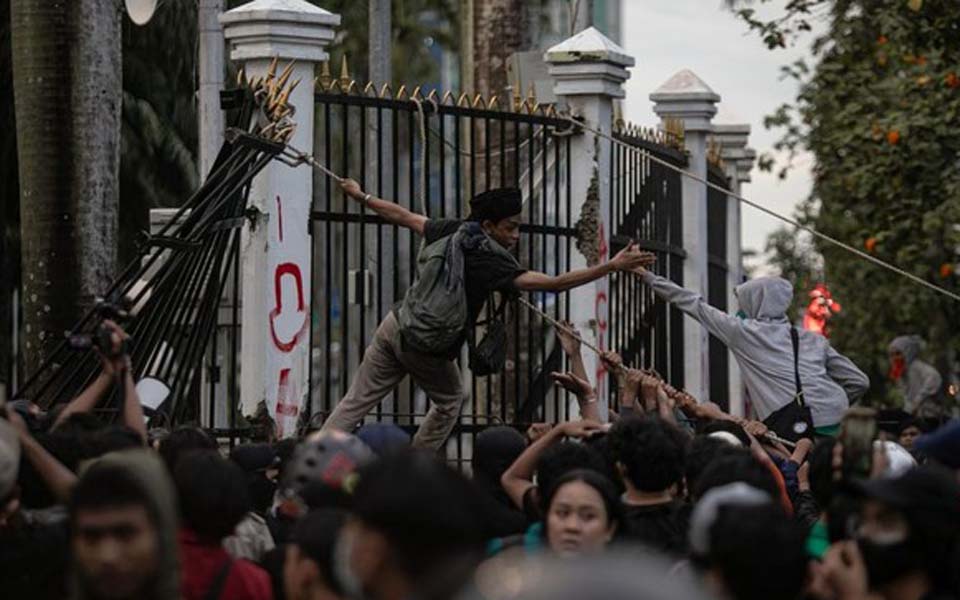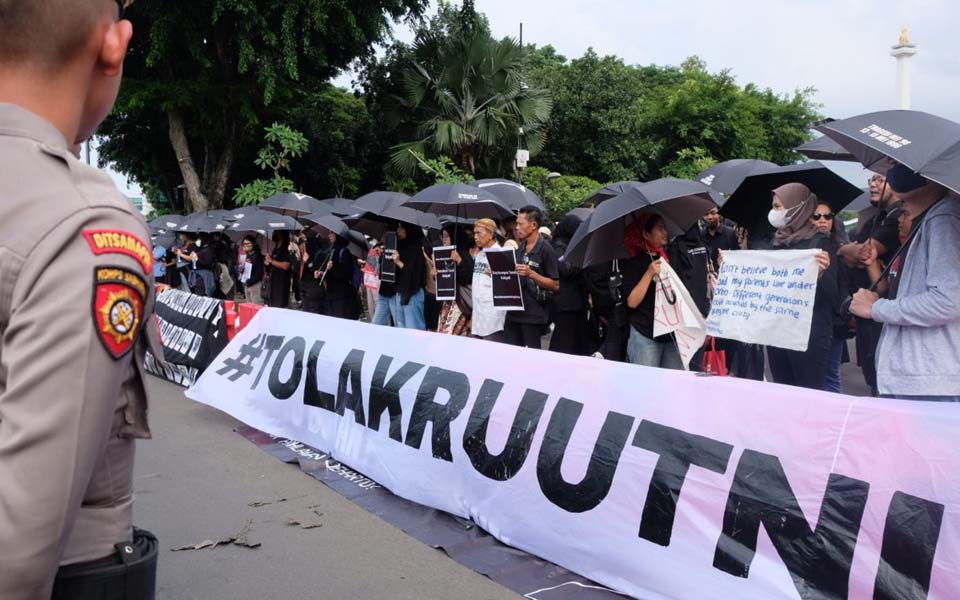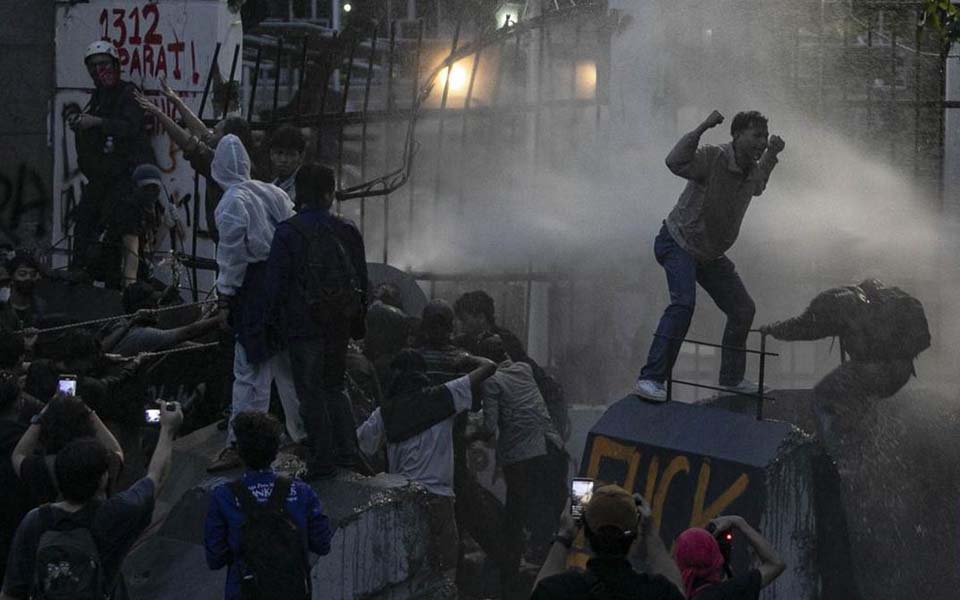Achmad Nasrudin Yahya, Jakarta – The Civil Society Coalition for Security Sector Reform is urging the government and the House of Representatives (DPR) to be transparent in its deliberations on the Draft Presidential Regulation (Perpres) on the Role of the Indonesian Military in Tackling Terrorism.
The call emerged after the draft regulation entered deliberations at the DPR.
“We are urging the government and the DPR to conduct the deliberations on the draft Perpres transparently”, said researcher and Indonesian Human Rights Watch (Imparsial) Director Al Araf in a press release on Sunday August 2.
The Civil Society Coalition for Security Sector Reform is made up of the Commission for Missing Persons and Victims of Violence (Kontras), Imparsial, the Institute for Public Research and Advocacy (Elsam), the Indonesian Legal Aid and Human Rights Association (PBHI), the Setara Institute for Peace and Democracy, the Human Rights Working Group (HRWG), the Indonesian Legal Aid Foundation (YLBHI), the Public Virtue Institute, Indonesian Corruption Watch ICW, the Legal Aid Institute for the Press (LBH Pers), the Jakarta Legal Aid Foundation (LBH Jakarta), the Institute for Criminal Justice Reform (ICJR), the Association for Elections and Democracy (Perludem) and the Indonesian Public Interest Lawyer Network (Pilnet Indonesia).
Araf said that the draft Perpres has already created controversy since it was rejected by the public after first being mooted by the Coordinating Minister for Security, Politics and Legal Affairs (Kemenko Polhukam). The rejection was based on a petition issued by academics, student activists and non-government organisations (NGOs).
According to Araf, the opposition emerged because the draft regulation will threaten democratic life and human rights in Indonesia because it gives broad and excessive authority to the TNI (Indonesian military) to counter acts of terror.
“In that context, the government and the DPR should really try to accommodate public input”, he asserted.
Thus it would be better if the government and the DPR convey the draft law directly to the public. “The government and the DPR cannot be allowed to conceal the draft Perpres which is now finished from the pubic”, he asserted.
Six principles
Araf said there are at least six principles which must be used as a basis for the Perpres to justify the involvement of the TNI in tackling terrorism.
“First, the TNI’s role in conducting military operations, aside from war, to tackle terrorist acts, its function is only to take measures”, explained Araf.
Araf explained that this is limited to things such as dealing with the highjacking of aircraft, ships or terrorism at state representative offices in friendly countries.
He believes that the TNI does not need to be involved in dealing with terrorist against vital strategic objects or terrorist threats against the president.
Next, the second principle is the use and deployment of the TNI must be based on a political decision by the state, namely a presidential decision with agreement from the DPR. Such a decision must be made in writing by the president and clarify the aim, timeframe, budget and number of personnel involved.
Third, the involvement of the TNI in domestic terrorism should be the last choice and only done if the police are unable to deal with a terrorist act.
Fourth, the involvement of the TNI must be temporary and for a specific time and cannot be allowed to be permanent because the TNI’s primary role is preparing for war.
Fifth, the involvement of the TNI must be subordinate to legal norms and human rights and sixth, the allocation of the budget for the TNI in tackling terrorism can only come from the state budget.
He added that the government and the DPR must be very serious and careful in deliberating the draft regulation so that the public input which has already been conveyed can be properly accommodated in the deliberations on the regulation.
“If this is not done, then the draft Perpres will endanger the life of the constitutional state, HAM and democracy in Indonesia”, asserted Araf.
Security sector reform
Setara Institute Chairperson Hendardi meanwhile said that the draft presidential regulation will destroy security sector reform.
“The national leadership under Jokowi [President Joko Widodo and Vice President] Ma’ruf Amin has been the weakest leadership in pursuing reform of the security sector because they have destroyed the design of the TNI and Polri [Indonesian police] as mandated by reformasi”, said Hendardi in a written release on Monday August 3.
According to Hendardi, the mandate of reformasi – the political reform process that began in 1998 – places the TNI as a tool of defense while the police are an instrument to maintain security, create public order and law enforcement.
Because of this, reform of the security sector will suffer a setback if the draft presidential regulation is enacted into law because it will allow the TNI to be free to prevent, act against and restore terrorist acts.
This will including the freedom for the TNI to access the state budget allocated for terrorism as well as be free from accusations of unfair trial and pretrial hearings if the TNI commits wrongdoing when dealing with terrorism.
“Instead of completing the reform of the security sector, Jokowi’s has in fact continued to pamper the TNI with privileges like their involvement in civil life without clear limitations”, said Handrail.
Hendardi added that based on the law, tackling terrorism requires prioritising a law enforcement approach so that all elements involved in taking measures against terrorism do so with operational liability and the protection of human rights.
“Because of this, a clear definition is need about terrorists acts which become the principal duty of the TNI and which terrorist acts fall under law enforcement agencies, so the potential for overlapping roles does not occur”, said Hendardi.
Big loss
Earlier, Coordinating Minister for Security, Politics and Legal Affairs, Mahfud MD was quoted by Tribune News as saying that the draft regulation on the TNI’s role in tackling terrorism has been completed.
Mahfud also said that the government has already has discussions with a number of NGOs. This was conveyed by Mahfud when he visited the Marine headquarters in South Jakarta on July 29.
“The draft regulation (on the involvement of the TNI in tacking terrorism) is done, it’s already with the DPR, and the debate was quite sharp. We have already discussed it with several groups, including our NGO friends. That terrorism is not just a legal matter, not all of it can be resolved by the police”, said Mahfud on Thursday July 30.
Nevertheless, Mahfud said that there are still several matters which need to be improved and harmonised although he is optimistic that the DPR will soon begin dealing with the draft regulation.
Mahfud said he is convinced that the TNI has the capacity to tackle terrorism and that and it would be a loss if this capacity was not used by the state against terrorism.
“If we look at it, it would be a big loss if these formidable troops are not used to tackle terrorism. The Denjaka [Navy Special Forces}, the Kopassus [Army Special Forces] and other elite troops, have the capacity to tackle terrorism, in accordance with the scale, type of difficulties and specific situations of course”, said Mahfud.
[Abridged translation by James Balowski. The original title of the article was “Rancangan Perpres Pelibatan TNI Berantas Terorisme Dikritik”.]







